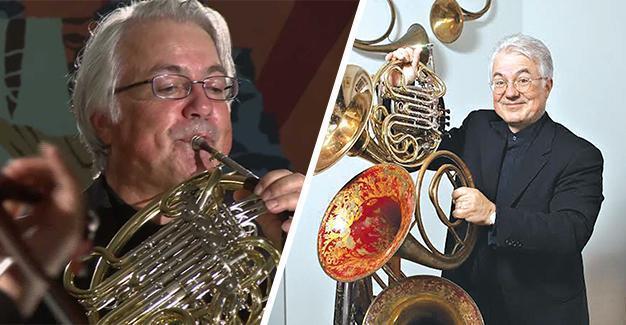Bruno Schneider comes for the love of horns
Cenk Erdem - ISTANBUL
 They say practice makes perfect, but it certainly helps when you’re a natural. Bruno Schneider picked up the horn when he was just 9 and has never looked back.
They say practice makes perfect, but it certainly helps when you’re a natural. Bruno Schneider picked up the horn when he was just 9 and has never looked back. Now, the master Swiss horn player will play in Istanbul on Feb. 28.
One of the most popular musicians in the classical music scene, having first received virtuosity with distinction in 1981 at the Music Academy in Detmold under the oversight of Michael Hoeltzel, Schneider began playing the horn at the Music Conservatory in La Chaux-de-Fonds with Robert Faller. The founder of the famous Horn Academy La Chaux de Fonds and the Swiss Horn Society, Schneider is also vice president of the International Horn Society. The musician has not only performed in all the world’s biggest concert halls as a soloist but is also a brilliant figure in chamber music. Schneider also has a book, titled “Horn Fundamentals,” which was published in 2012. During the Istanbul show at the Cemal Reşit Rey (CRR), Schneider and the Modigliani Quartet will be accompanied by clarinet player Sabine Meyer, bassist Knut Erik Sundquist and bassoonist Dag Jensen. Luckily, I had a chance to ask some questions about his career and his story with the horn just before the upcoming Istanbul gig.
You are one of the most popular horn players on the classical music scene, but do you remember what attracted you most about playing the horn when you were a kid?
Yes I remember very well! I received my first instrument when I was 7. It was a clarion, you know, a trumpet without valves, and I started to blow the hell out of it; obviously my lips were doing a good job from the beginning. When I was 9, I decided to play the horn after I listened to Hermann Baumann in my hometown playing a Mozart concerto.
The horn is one of the hardest musical instruments to play, so did you ever tell yourself “I can’t do this” at the beginning?
You know, it’s funny; my father had me sign an agreement when I started the horn. He would buy an instrument and pay for the lessons, but I had to practice every day. That’s what I did and still do now. I was never really despondent with difficulties.
It’s been more than three decades since you received your virtuosity with distinction in 1981 at the Music Academy in Detmold, but do you still explore the possibilities in music playing the horn?
Yes, I explore and discover new repertoires with great pleasure, and observing my relation to the instrument while seeing how the techniques have evolved over the years is fascinating. The day I get bored of playing I will stop.
Many composers such as Norbert Moret, Jost Meyer, Eric Chasalow and Jörg Widmann have written major works for you, but honestly, can you name the most inspiring piece of work ever written for you?
I don’t have one piece I prefer. To have pieces written for me is a big responsibility, and I am just a bit sorry that I don’t get to play the concertos written for me more often.
You are the founder of the famous Horn Academy La Chaux de Fonds and the Swiss Horn Society and you have been vice president of the International Horn Society. Given that, can we say you have devoted your life to the horn?
The choice to become a musician was a free choice in my life! And the high expectations I have for my playing give me the energy to practice. The administrative jobs are side effects that come with a certain notoriety. I could say I have devoted my professional life to the horn, but there are many other lives.
Isn’t your wife a little bit of jealous of your love of the horn, or has she ever complained about your work?
My wife is from Istanbul, a city full of passion, and she helped me a lot and her support has been always [fantastic].
You are to perform with the famous Modigliani Quartet in Istanbul on Feb. 28. How would you describe the night for the audience?
We will play Mozart and Schubert, two composers who died very young. Come and listen to the music of two young men who were passionate and full of life.
















